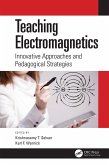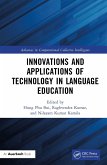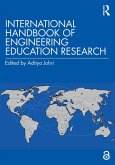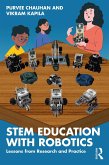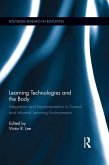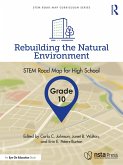Advancing Engineering Education Beyond COVID (eBook, PDF)
A Guide for Educators
Redaktion: Gratchev, Ivan; Espinosa, Hugo G.
73,95 €
73,95 €
inkl. MwSt.
Sofort per Download lieferbar

37 °P sammeln
73,95 €
Als Download kaufen

73,95 €
inkl. MwSt.
Sofort per Download lieferbar

37 °P sammeln
Jetzt verschenken
Alle Infos zum eBook verschenken
73,95 €
inkl. MwSt.
Sofort per Download lieferbar
Alle Infos zum eBook verschenken

37 °P sammeln
Advancing Engineering Education Beyond COVID (eBook, PDF)
A Guide for Educators
Redaktion: Gratchev, Ivan; Espinosa, Hugo G.
- Format: PDF
- Merkliste
- Auf die Merkliste
- Bewerten Bewerten
- Teilen
- Produkt teilen
- Produkterinnerung
- Produkterinnerung

Bitte loggen Sie sich zunächst in Ihr Kundenkonto ein oder registrieren Sie sich bei
bücher.de, um das eBook-Abo tolino select nutzen zu können.
Hier können Sie sich einloggen
Hier können Sie sich einloggen
Sie sind bereits eingeloggt. Klicken Sie auf 2. tolino select Abo, um fortzufahren.

Bitte loggen Sie sich zunächst in Ihr Kundenkonto ein oder registrieren Sie sich bei bücher.de, um das eBook-Abo tolino select nutzen zu können.
This book presents and discusses learning and teaching practices that can be successfully adopted in daily teaching by educators from a range of engineering and science disciplines. Leading educators share their research-informed practices that assist in engaging students in the course work.
- Geräte: PC
- ohne Kopierschutz
- eBook Hilfe
- Größe: 24.89MB
Andere Kunden interessierten sich auch für
![Advancing Engineering Education Beyond COVID (eBook, ePUB) Advancing Engineering Education Beyond COVID (eBook, ePUB)]() Advancing Engineering Education Beyond COVID (eBook, ePUB)73,95 €
Advancing Engineering Education Beyond COVID (eBook, ePUB)73,95 €![Teaching Electromagnetics (eBook, PDF) Teaching Electromagnetics (eBook, PDF)]() Teaching Electromagnetics (eBook, PDF)60,95 €
Teaching Electromagnetics (eBook, PDF)60,95 €![Innovations and Applications of Technology in Language Education (eBook, PDF) Innovations and Applications of Technology in Language Education (eBook, PDF)]() Innovations and Applications of Technology in Language Education (eBook, PDF)134,95 €
Innovations and Applications of Technology in Language Education (eBook, PDF)134,95 €![International Handbook of Engineering Education Research (eBook, PDF) International Handbook of Engineering Education Research (eBook, PDF)]() International Handbook of Engineering Education Research (eBook, PDF)0,99 €
International Handbook of Engineering Education Research (eBook, PDF)0,99 €![STEM Education with Robotics (eBook, PDF) STEM Education with Robotics (eBook, PDF)]() Purvee ChauhanSTEM Education with Robotics (eBook, PDF)40,95 €
Purvee ChauhanSTEM Education with Robotics (eBook, PDF)40,95 €![Learning Technologies and the Body (eBook, PDF) Learning Technologies and the Body (eBook, PDF)]() Learning Technologies and the Body (eBook, PDF)40,95 €
Learning Technologies and the Body (eBook, PDF)40,95 €![Rebuilding the Natural Environment, Grade 10 (eBook, PDF) Rebuilding the Natural Environment, Grade 10 (eBook, PDF)]() Rebuilding the Natural Environment, Grade 10 (eBook, PDF)25,95 €
Rebuilding the Natural Environment, Grade 10 (eBook, PDF)25,95 €-
-
-
This book presents and discusses learning and teaching practices that can be successfully adopted in daily teaching by educators from a range of engineering and science disciplines. Leading educators share their research-informed practices that assist in engaging students in the course work.
Dieser Download kann aus rechtlichen Gründen nur mit Rechnungsadresse in A, B, BG, CY, CZ, D, DK, EW, E, FIN, F, GR, HR, H, IRL, I, LT, L, LR, M, NL, PL, P, R, S, SLO, SK ausgeliefert werden.
Produktdetails
- Produktdetails
- Verlag: Taylor & Francis
- Seitenzahl: 258
- Erscheinungstermin: 30. Dezember 2022
- Englisch
- ISBN-13: 9781000750171
- Artikelnr.: 66916112
- Verlag: Taylor & Francis
- Seitenzahl: 258
- Erscheinungstermin: 30. Dezember 2022
- Englisch
- ISBN-13: 9781000750171
- Artikelnr.: 66916112
Dr Ivan Gratchev is a Senior Lecturer at the Griffith School of Engineering, Griffith University, Australia. He graduated from Moscow State University (Russia) and received his PhD from Kyoto University (Japan). He worked as a research fellow in the geotechnical laboratory of the University of Tokyo (Japan) before joining Griffith University (Australia) as a lecturer. His research interests are in geotechnical aspects of landslides, soil liquefaction, and rock mechanics. He has published numerous research articles in leading international journals and international conferences. Since joining Griffith University in 2010, Dr Gratchev has taught several engineering courses (including soil mechanics, rock mechanics and geotechnical engineering practice) using a project-based approach. His teaching achievements were recognised by his peers and students through several learning and teaching citations and awards, including Senior Fellow of the Higher Education Academy (SFHEA). Dr Gratchev's innovative approach to teaching resulted in publication of two textbooks which have become a popular study resource among students around the world. Dr Hugo G Espinosa received his bachelor's degree in Electronics and Telecommunications Engineering from the Monterrey Institute of Technology and Higher Education, Mexico; his master's degree from the University of Sao Paulo, Sao Paulo, Brazil; and his Ph.D. degree (Summa Cum Laude) from the Technical University of Catalonia, Barcelona, Spain, in Electrical Engineering. He has been a visiting researcher at the Federal Polytechnic School of Lausanne, Lausanne, Switzerland, and a Postdoctoral Fellow at the School of Electrical Engineering, Tel Aviv University, Tel Aviv, Israel. Since 2014, he has been with the School of Engineering and Built Environment, Griffith University, Brisbane, QLD, Australia, where he is currently a Senior Lecturer in electronic engineering, and the First-year Coordinator for Engineering (Nathan Campus). Dr Espinosa is a Senior Member of the Institute of Electrical and Electronic Engineers (IEEE). He is the Chair of the Microwave Theory and Techniques/Antennas and Propagation (MTT/AP) Joint Chapter of the IEEE Queensland Section. He is also a member of the IEEE Education Society and the IEEE Antennas and Propagation Education Committee. Dr. Espinosa is Associate Editor and Editorial Board member of several academic journals, and the co-author of three book chapters of the recently published engineering education book entitled Teaching Electromagnetics: Innovative Approaches and Pedagogical Strategies (CRC Press). His research interests include engineering education, computational electromagnetics, antennas and propagation, electromagnetic separation of conducting materials, inertial-magnetic sensors, wearable sensor technology for human monitoring, and wearable technology in STEM.
1. Changes in Student Demographics, Behavior, and Expectations in Higher
Education. 2. Engagement in the Blended Learning Model of a Post-COVID
University. 3. Developing Video Resources in Engineering Education:
Evidence-Based Principles for Effective Practice. 4. The Effective Learning
Strategies for Teaching in COVID and Beyond: Connecting and Aligning
Content With Context. 5. Replacing Laboratory Work With Online Activities:
Does It Work?. 6. The Return to the Classroom After the Lockout, New
Challenges, New Education for a New Society?. 7. Experiences of
Fully-Remote Instruction for a Laboratory Course in Microwave Engineering.
8. Geo-Engineering Teaching and Learning During the COVID-19 Lockdown: The
University of Auckland Experience. 9. Engineering Students' Stress and
Mental Health: An Essential Piece in the Retention Puzzle. ¿10. Evaluating
the Impact of COVID-19 Pandemic on Students' Learning Experiences. 11.
Reflections on Engineering Course Delivery - A Student Perspective. 12.
Beyond COVID-19: Insights on the Future of Engineering Education.
Education. 2. Engagement in the Blended Learning Model of a Post-COVID
University. 3. Developing Video Resources in Engineering Education:
Evidence-Based Principles for Effective Practice. 4. The Effective Learning
Strategies for Teaching in COVID and Beyond: Connecting and Aligning
Content With Context. 5. Replacing Laboratory Work With Online Activities:
Does It Work?. 6. The Return to the Classroom After the Lockout, New
Challenges, New Education for a New Society?. 7. Experiences of
Fully-Remote Instruction for a Laboratory Course in Microwave Engineering.
8. Geo-Engineering Teaching and Learning During the COVID-19 Lockdown: The
University of Auckland Experience. 9. Engineering Students' Stress and
Mental Health: An Essential Piece in the Retention Puzzle. ¿10. Evaluating
the Impact of COVID-19 Pandemic on Students' Learning Experiences. 11.
Reflections on Engineering Course Delivery - A Student Perspective. 12.
Beyond COVID-19: Insights on the Future of Engineering Education.
1. Changes in Student Demographics, Behavior, and Expectations in Higher
Education. 2. Engagement in the Blended Learning Model of a Post-COVID
University. 3. Developing Video Resources in Engineering Education:
Evidence-Based Principles for Effective Practice. 4. The Effective Learning
Strategies for Teaching in COVID and Beyond: Connecting and Aligning
Content With Context. 5. Replacing Laboratory Work With Online Activities:
Does It Work?. 6. The Return to the Classroom After the Lockout, New
Challenges, New Education for a New Society?. 7. Experiences of
Fully-Remote Instruction for a Laboratory Course in Microwave Engineering.
8. Geo-Engineering Teaching and Learning During the COVID-19 Lockdown: The
University of Auckland Experience. 9. Engineering Students' Stress and
Mental Health: An Essential Piece in the Retention Puzzle. ¿10. Evaluating
the Impact of COVID-19 Pandemic on Students' Learning Experiences. 11.
Reflections on Engineering Course Delivery - A Student Perspective. 12.
Beyond COVID-19: Insights on the Future of Engineering Education.
Education. 2. Engagement in the Blended Learning Model of a Post-COVID
University. 3. Developing Video Resources in Engineering Education:
Evidence-Based Principles for Effective Practice. 4. The Effective Learning
Strategies for Teaching in COVID and Beyond: Connecting and Aligning
Content With Context. 5. Replacing Laboratory Work With Online Activities:
Does It Work?. 6. The Return to the Classroom After the Lockout, New
Challenges, New Education for a New Society?. 7. Experiences of
Fully-Remote Instruction for a Laboratory Course in Microwave Engineering.
8. Geo-Engineering Teaching and Learning During the COVID-19 Lockdown: The
University of Auckland Experience. 9. Engineering Students' Stress and
Mental Health: An Essential Piece in the Retention Puzzle. ¿10. Evaluating
the Impact of COVID-19 Pandemic on Students' Learning Experiences. 11.
Reflections on Engineering Course Delivery - A Student Perspective. 12.
Beyond COVID-19: Insights on the Future of Engineering Education.


